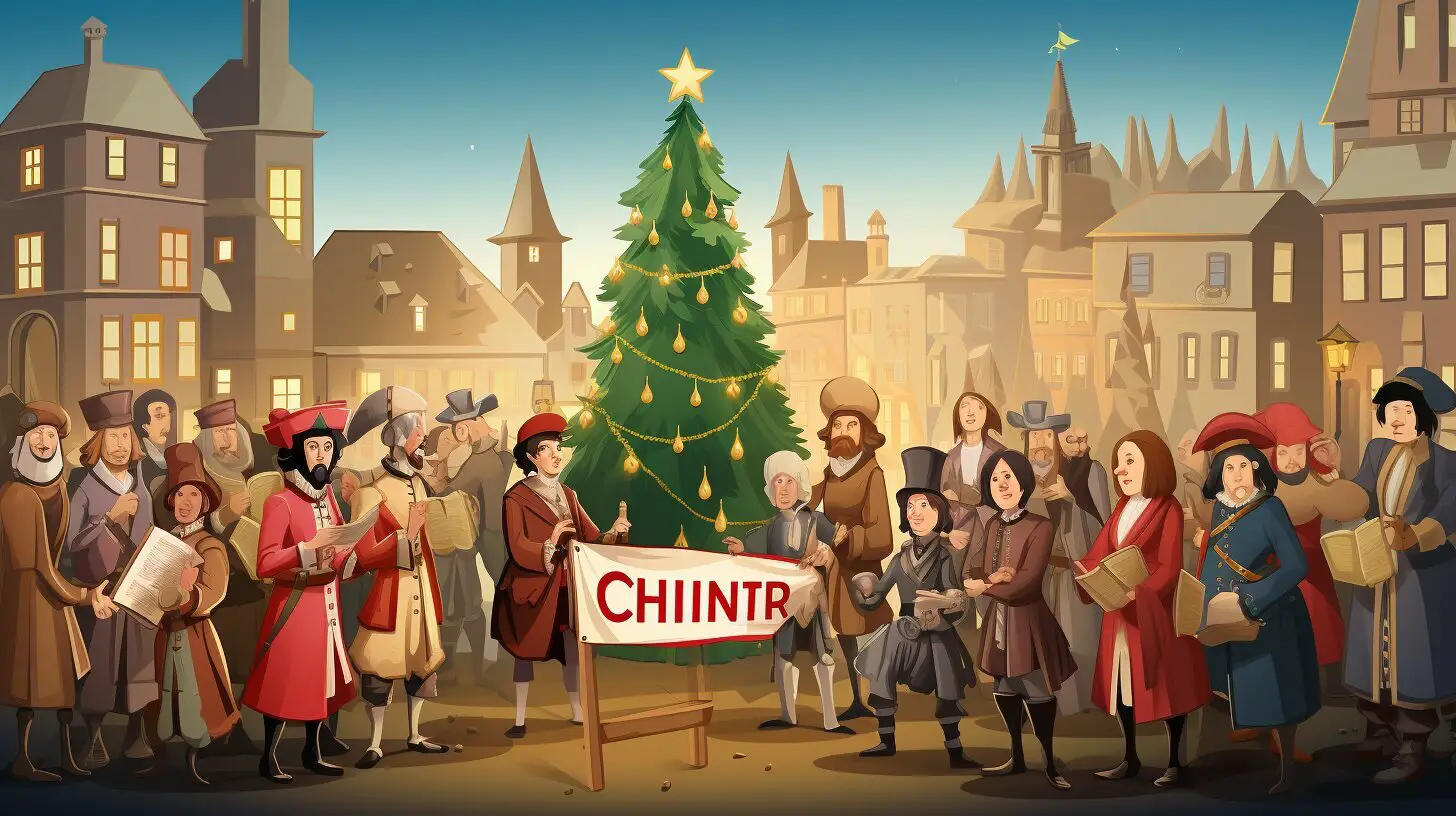Join me as we dive into history to uncover the truth behind the controversial ban on Christmas in a certain U.S. city in 1659. Christmas, a holiday widely celebrated today, was actually forbidden in parts of America for a number of decades. Let’s explore the reasons behind this ban and the impact it had on the city and its residents.
Key Takeaways:
- In 1659, the General Court of the Massachusetts Bay Colony in Boston enacted a ban on publicly celebrating Christmas.
- The ban was a result of the Puritans’ disdain for the holiday, stemming from religious and cultural reasons.
- Puritans believed that Christmas had no scriptural basis and was rooted in pagan traditions.
- The ban lasted for over two decades before being repealed in 1681.
- Although the ban was lifted, Christmas celebrations remained unpopular in New England for many years.
The Puritan Disdain for Christmas
The pious Puritans who settled in the Massachusetts Bay Colony in the 17th century held a deep disdain for Christmas, viewing it as a pagan and unscriptural holiday. They believed that the celebration of Christmas was not supported by any biblical basis and lacked any mention of the Nativity or a specific date for the birth of Jesus.
According to author Stephen Nissenbaum, the Puritans saw Christmas as a pagan custom that had been co-opted by the Catholic Church without any true religious significance. They were particularly troubled by the rowdy and excessive celebrations that took place during Christmas in the 1600s. These celebrations resembled pagan festivals such as Saturnalia, which involved heavy drinking, feasting, gambling, and licentious behavior.
In their efforts to maintain a society in line with biblical teachings, the Puritans saw the observance of Christmas as a grave dishonor to God. They even went so far as to pass laws in 1659 in the Massachusetts Bay Colony, making it a criminal offense to publicly celebrate Christmas. Those found observing the holiday by forbearing from labor, feasting, or any other manner were subject to a fine of five shillings.
Despite the ban on public celebrations, Christmas continued to be celebrated in private homes, particularly in fishing towns outside of Boston known for their irreligious and indulgent lifestyles. The ban on Christmas remained in place in Massachusetts for over two decades until it was reluctantly repealed in 1681 under increasing political pressure from the English monarchy.
| Key Points: | Quotes: |
|---|---|
| – Puritans viewed Christmas as pagan and unscriptural. | “The Puritans believed Christmas was basically just a pagan custom that the Catholics took over without any biblical basis for it.” – Stephen Nissenbaum |
| – They objected to the rowdy and excessive celebrations during Christmas. | “Men dishonor Christ more in the 12 days of Christmas than in all the 12 months besides.” – Hugh Latimer |
| – In 1659, the Massachusetts Bay Colony passed laws banning public Christmas celebrations. | “…every such person so offending shall pay for every such offense five shillings, as a fine to the county.” – Massachusetts Bay Colony decree |
| – The ban on Christmas in Massachusetts was repealed in 1681. | “…Christmas was still far from popular with the Puritans.” – Edward Everett Hale |
Despite the repeal, hostility towards the public celebration of Christmas persisted in Massachusetts for years to come. It was not until 1856 that Christmas became a recognized public holiday in the state, along with Washington’s Birthday and the Fourth of July. Today, Christmas is widely celebrated in Boston and throughout the United States, but the Puritans’ disdain for the holiday and their influence on early American culture cannot be forgotten.
The Ban on Christmas in Massachusetts
In 1659, the General Court of the Massachusetts Bay Colony made a groundbreaking decision to outlaw the public celebration of Christmas, imposing strict fines on those who dared to observe the holiday. The Puritans, who founded the colony, had a strong disdain for Christmas due to their strict religious beliefs and the rowdy nature of the holiday festivities in the 1600s.
The Puritans believed that there was no scriptural basis for commemorating Christmas and saw it as a pagan custom that had been co-opted by the Catholic Church. They noted that the Bible did not mention a specific date for the birth of Jesus and viewed the pagan roots of Christmas, such as the Roman holiday Saturnalia, as incompatible with their religious principles. They saw Christmas celebrations as a time of excessive feasting, drinking, gambling, and licentious behavior, which they believed dishonored Christ and led to disorder in society.
To enforce their ban on Christmas, the Massachusetts Bay Colony imposed a 5-shilling fine on anyone found observing the holiday in any way, including forbearing from labor or engaging in feasting. While there are no records of actual prosecutions under this law, it served as a means to prevent disorderly behavior associated with Christmas festivities.
The ban on Christmas in Massachusetts lasted for over 20 years, even after the monarchy was restored in England in 1660 and Christmas celebrations became legal again. It was not until 1681 that the ban was eventually repealed, under pressure from the king of England. However, hostility towards Christmas remained among the Puritans in Massachusetts for years to come, with businesses and schools remaining open on December 25 and churches staying closed.
Only in 1856 did Christmas finally become a recognized public holiday in Massachusetts, along with Washington’s Birthday and the Fourth of July. The gradual revival of Christmas celebrations in America led to the widespread observance of the holiday, complete with traditional customs such as decorating Christmas trees, exchanging gifts, and sharing festive meals.
Here is a table summarizing the key points about the ban on Christmas in Massachusetts:
| Date | Action |
|---|---|
| 1659 | The General Court of the Massachusetts Bay Colony bans the public celebration of Christmas |
| 1681 | The ban is repealed under pressure from the king of England |
| 1856 | Christmas becomes a recognized public holiday in Massachusetts |
In conclusion, the ban on Christmas in Massachusetts in 1659 was a result of the Puritans’ disdain for the holiday’s pagan roots and rowdy celebrations. Although the ban was eventually lifted, it took several decades for Christmas to become widely celebrated in the region. The legacy of the ban serves as a reminder of the Puritans’ strict religious beliefs and their attempt to create a society based on biblical principles.
Christmas Revival and Legacy
Despite the ban on Christmas in Massachusetts being repealed in 1681, the Puritan influence continued to stifle the holiday’s celebration in New England, while the rest of America slowly embraced the festive traditions. The Puritans’ disdain for Christmas was deeply rooted in their religious beliefs and cultural values. They saw Christmas as a pagan custom co-opted by Catholics without biblical basis, and the rowdy revelry associated with the holiday only fueled their rejection of it.
In fact, the Puritans’ aversion to Christmas was so strong that even after the ban was lifted, the holiday remained unpopular in Massachusetts for many years. Businesses and schools stayed open on December 25, and churches were often closed. It wasn’t until 1856 that Christmas finally became a recognized public holiday in Massachusetts, along with George Washington’s Birthday and the Fourth of July.
Meanwhile, the rest of America gradually embraced the revival of Christmas celebrations. The influence of literature and popular culture played a significant role in shaping the image of Christmas as a time of joy, family gatherings, and gift-giving. Works like Washington Irving’s account of Christmas at Bracebridge Hall, Charles Dickens’ A Christmas Carol, and Clement Moore’s “A Visit from Saint Nicholas” added to the growing enthusiasm for the holiday.
Over time, Christmas became widely observed across the American colonies, complete with decorated trees, mistletoe, eggnog, and candy canes. Today, Christmas is one of the most cherished holidays in the United States, marked by festive decorations, gift exchanges, family gatherings, and religious services.
| Key Points: |
|---|
| Despite the repeal of the ban, Puritan influence stifled Christmas celebrations in New England. |
| Christmas remained unpopular in Massachusetts for many years. |
| The rest of America gradually embraced the revival of Christmas traditions. |
| Literature and popular culture played a significant role in shaping the image of Christmas. |
| Christmas is now widely observed across the United States. |
Conclusion
The ban on Christmas in a certain U.S. city in 1659 served as a stark reminder of the Puritans’ religious zeal and their efforts to suppress what they perceived as pagan and unscriptural celebrations. The Puritans, who migrated from England to establish the Massachusetts Bay Colony, had a disdain for Christmas due to their strict interpretation of the Bible and the rowdy festivities that accompanied the holiday in the 1600s.
The ban on Christmas in Massachusetts was part of a larger movement among Puritans in both England and the New World to eliminate what they considered to be superstitious and idolatrous practices. The Puritans believed that there was no biblical basis for celebrating the Nativity and saw the pagan origins of the holiday as further evidence of its ungodliness. The ban in Massachusetts was enforced through a legal decree in 1659, imposing fines on anyone caught observing Christmas in any way, including abstaining from work or engaging in feasting.
Although the ban on Christmas was eventually repealed in 1681, the Puritan influence continued to shape the celebration of the holiday in New England for many years to come. Even after it became legal to publicly celebrate Christmas in England, Massachusetts remained resistant, with businesses and schools remaining open on December 25 well into the 1800s. It wasn’t until 1856 that Christmas was officially recognized as a public holiday in Massachusetts, alongside Washington’s Birthday and the Fourth of July.
The legacy of the Christmas ban in Massachusetts serves as a testament to the lasting impact of the Puritans’ religious beliefs and their efforts to enforce their strict interpretation of Christianity. While Christmas has since become a widely celebrated holiday in the United States, the history of its prohibition in a certain U.S. city in 1659 reminds us of the diverse religious traditions that have shaped American society.
FAQ
Q: Which U.S. city banned Christmas in 1659?
A: The city that banned Christmas in 1659 was Boston, Massachusetts.
Q: Why did the Puritans dislike Christmas?
A: The Puritans had disdain for Christmas due to theological reasons and the rowdy pagan-like celebrations associated with the holiday in the 1600s.
Q: What were the penalties for celebrating Christmas in Massachusetts in 1659?
A: Anyone found observing Christmas in Massachusetts in 1659 was subject to a 5-shilling fine.
Q: When was the ban on Christmas in Massachusetts repealed?
A: The ban on Christmas in Massachusetts was repealed in 1681, but hostility towards the holiday remained for years to come.
Q: When did Christmas become a recognized holiday in New England?
A: Christmas did not become a recognized holiday in New England until 1856.


